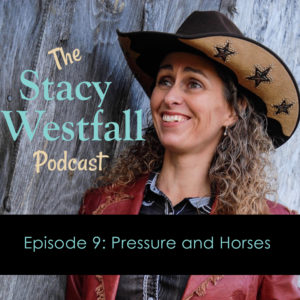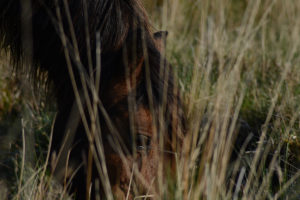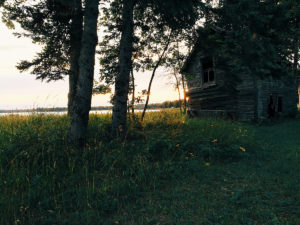How riders view pressure will affect their horses: Podcast Episode 9

Issues that affect the way a rider thinks has been the topic for this podcast season. This episode is about something that you should spend some time contemplating when you are at home sitting on the couch. If you do, it will change the way you ride.
This topic is pressure. How do you react when you hear me say pressure? What flashes in your mind? What do you picture when I say pressure and horse? Understanding that pressure isn’t always a bad thing, and the right pressure will allow your horse to learn and grow, can make you a better rider.
“I propose that it’s a form of pressure that builds a horse's mind.” Stacy Westfall Click To TweetSubscribe and never miss an episode! (I listen in the barn and when I’m out driving)
Subscribe for Free!
Show Notes
[03:37] My first podcast episode is set to a video of horses playing on YouTube. When you watch the horses play, you are watching an entire game of pressure.
[03:58] Horses aren’t afraid of pressure. A lot of riders try to create a pressure-free world for their horses, but it isn’t real.
[04:39] A pressure-free world isn’t a realistic view of our lives or of the horse’s life.
[05:07] If you watch horses in the wild, there is pressure from other horses. There is also external pressure from the environment.
[05:54] To build muscle, we need a form of resistance or pressure.
[06:11] I propose that it is a form of pressure that builds a horse’s mind.
[06:19] Applying pressure on can break down a horse mentally if done wrong.
[06:30] By avoiding pressure the horse becomes weaker.
[07:13] Denny Emerson of Tamarack Hill Farm talks about pressure and how it depends on context.
[09:33] My bareback bridleless ride with Roxy was not created without pressure.

Pressure as a theory is not just a theory for people. It can become a theory and principle for horses.
[10:15] Roxy understood that the pressure wasn’t something to run from.
[10:39] We can also teach the horse by holding contact with the reins.
[11:01] You can teach the horse that training isn’t a scary thing, but before that happens you have to believe it in your mind.
[11:14] A simple, but not easy exercise. Take the slack out of the reins and find the rhythm of the horse’s head as it walks.

[11:36] When a horse walks their head moves up and down or slightly forward and back.
[12:17] Following the horse’s head with your hand makes you easy to hold hands with.
[12:49] If you have a tenseness about the idea of contact in your mind, you won’t have a good result.
[13:18] Both people and horses need to understand pressure in order to learn things.
[14:20] To advance in life, you need to be able to understand and handle degrees of pressure.
“To advance in life, you need to be able to understand and handle degrees of pressure.” Stacy Westfall Click To TweetLinks and Resources:
Stacy Westfall first Podcast on YouTube (watch the horses apply pressure to each other)
Stacy Westfall Championship Bareback & Bridleless Freestyle Reining with Roxy
17 Comments
Leave a Comment
SUBSCRIBE TO THE PODCAST HERE:





YOURS FREE
WHY IS MY HORSE...?





For some reason, i took this as i need to learn how to deal with pressure in my life so it stops adversely affecting my horse. When I think of pressure, I think of panic. When I think of pressure and horsez, I think of frustration. I think that dealing with my how I process pressure and allow it to affect me will help me to be able to communicate more effectively with my horse.
I really can’t wait to try this exercise. I feel like this issue has held me back so much. I’ve been so afraid of hurting the horse (teachers telling me the horse is sensitive, he can feel a fly land on him so….) that I’ve messed up in this area big time. It wasn’t until last year that a friend helped me understand that pressure is actually connection and communication, not punishment, that I had a breakthrough in my understanding of riding. It’s been a while since I’ve ridden and I feel like this is kind of a relaunch of learning for me and a greasy start particularly in the way I’m thinking. Very excited and so grateful for this information and knowledge!
Uh fresh start not greasy…. Lol. Not sure a greasy start would give me any kind of proper pressure.
Well, you’ve given me lots to think about. Very informative. I do have a question, however. Three weeks ago I purchased a 7-year-old mare who has never been trained in any way. The owners were elderly and while they had a pretty good operation at one time they got out of the business about the same time this mare was born but just never sold her. She’s basically been a pet. They were not very informative about what she could or could not do. When I asked if she would tie I was told, “Well, she stands for the farrier.” Anyway, these past three weeks have been a kind of show and tell. I’ve learned she’s halter broke, will lead some and will give to pressure. After a pretty good session I decided to tie her to see how she’d do. As soon as I walked away she began to frantically pace. At one point she pulled back for about 5 seconds but stopped and began the frantic pacing again. After about three minutes I untied her and tried to lead her back to the round pen. It was as if everything she knew flew out the window. She walked all over me, acting as if I weren’t even there, snorting and wide-eyed. The 30 feet to the pen were crossed by allowing her to make semi circles around me as I worked her to the pen. I lunged her until she calmed down and I got her undivided attention again and then I let her go. I wanted to end on a positive note. I’ve been reviewing the Jac series and when I work her again I’ll be backing up a little on her progress. What I don’t get is, why did she panic when tied, although she gives to pressure so willingly?
There is emotional pressure and physical pressure. It sounds like you are saying she gives to physical pressure when leading. Have you seen the Jac episode where I take off running and pull on the rope? I’m preparing him for tying. The running triggers both emotional and physical but prior to that I did LOTS of emotional pressure work. Whips, tarps, balls, lunging at speed (on the lunge line where he would feel physical pressure).
When you tied her and walked away, how does her reaction compare to other times when she has been ‘alone’? Does she pace in a stall when alone? Or was tying one of the first ‘alone’ moments she has had? Does she crave being with other horses and/or you (herd-bound stuff)? All things to think about.
In short, she was emotionally triggered and then didn’t have the skills to recover. Much like a person who gets worked up but doesn’t know how to come back down after.
It sounds like your idea of going back will be a good idea.
Will you address the release?
Yes. It will come up during future podcast episodes. If you have specific questions feel free to leave them here or call them in and I’ll work it into the upcoming podcasts:)
I have listened to all the podcasts to date, however, am commenting for the first time. I’m usually listening in the barn and it isn’t conducive to leaving a comment. At least for me it isn’t, since I am techno challenged. I have had so many thoughts as I listen on the various topics. Fear Vs Danger – My fear encroaches because I don’t always trust myself – to have the right answer, to be strong enough (due to some health issues), to react quick enough, to be able to stay in the saddle. Some days my fear is correct – don’t take on that battle right now, but sometimes because it has been correct, I allow it to stop me. Hard to decide what today is bringing – my health, horse’s brain, etc.
The horse’s path is different from my path – Oh my Lord!!!! Yes. Since being diagnosed with Fibromyalgia, which affects my energy level greatly, my brain might say do this, but my body says I don’t think so. My poor horse is confused. I have sympathy for him. This is when I get caught up in the internal argument of failure vs disappointment. Have I failed my horse? Not really. Not after listening to this podcast. He is healthy, and happy. When I am asking correctly and with the right amount of pressure, he does his best for me. Pressure – My first reaction to hearing you use that word, was “What kind? How much?” I do believe I put more pressure on me to “perform” in some way, as I have been riding for many years, than I should. Since my diagnosis, I am learning to accept that some days the pressure is more than I can deal with and change my “goal” for that day or event. I have had to lower some of my expectations in order to have some forward motion. “Just get there. Get on your horse and don’t fall off.” Learning to re-define success. Thanks so much Stacy for helping me put some these thoughts in words. I am moving forward.
Anne- Thanks for taking the time to come leave a comment! I also listen to podcasts in the barn and I agree that it isn’t conducive to leaving comments. My goal with the podcast was to get people thinking…it sounds like I’ve done that for you! I love exploring all of these thoughts because they do change how we show up in the barn. More podcasts coming!
Very thought provoking, thank you! I am keen to learn more about concrete examples on how to apply this. We work with a very forward going breed that tends to be a little high strung (Marwari) and so traditionally trainers here have taught them to be numb to pressure. I, on the other hand, have probably gone the other way and preserved them for pressure (creating a fake ideal world – so true!). But how can I teach a horse, especially a green horse, to accept pressure and to look for contact? I understand the example with the hand contact but I’m more confused with the leg contacts. Say you put your leg contact, the horse move forwards, you slow him down but you keep the contact. Doesn’t it mean you’ll have to put MORE contact further down the line to achieve the effect that you could get with less contact had before? Or is it that I’m once again seeing pressure as bad, and perhaps using more contact is not a bad thing? Thanks in advance and very much looking forward to the next podcasts.
I’m planning on addressing this idea of pressure in many ways as the podcast continues. I have a friend at the Kentucky Horse Park who works with a Marwari (and agrees they are a little high strung). The easiest way to think about pressure is that there is a middle ground between no pressure and heavy pressure. Put this into holding hands with someone; not touching, firm/gentle holding, hard/squeezing. These stages are possible with the hands or the legs of the rider. There is a saying that you ride a lazy horse with less leg and a hot horse with more leg. Seems backward? Right? But the reasoning is that a lazy horse will get lazier if he becomes dull…so we ride with contact-response-release. The hot horse will become even hotter if we do that so we ride with contact-softer contact-contact. Think of contact with your legs like giving someone a hug. Contact in your hands can feel like holding hands with someone you love, using your legs can feel like giving a hug. Pressure doesn’t have to be a bad thing.
Part of your question does have to do with the grade level of the horse. Young horses are ridden with a less complicated system than an advanced horse. Still, if you go back and watch some of the Stacy Video Diary: Jac episodes you will find that I’m riding with contact for a very long time! https://youtu.be/z_Q498tgE28
The contact on a young colt doesn’t look the same as a fully developed horse because early on the horse believes that reins are for steering/stopping and legs are for ‘go’. And early on he is right. Somewhere down the line we may choose to advance his training. When we do that the reins are going to mean ‘collect’ and the legs are also going to be part of ‘collect’…and collect involves a thought of slowing down.
I will get into this more as the podcasts continue but I hope this helps a bit for now!
What I took from this is that you’re trying to educate the rider to take a more objective view of training. In other words, to explain that certain principles, such as pressure, need to be divorced from value judgments. Pressure, as a concept, is neutral, though good and bad pressure do exist. I understand your reasoning for this. Horse ‘culture’, which starts with the stories we first hear about horses (Denny Emerson explains this when he talks about The Black Stallion), means our initial understanding and relationships with horses are loaded with emotion and meaning. To be able to step away from that can be challenging, but necessary if we want to provide our horses and, by extension, ourselves with the best experiences. (I had to remember this last weekend when I took my young OTTB out for trail ride and encountered some frightening and unexpected obstacles. The pressure was intense, but I think the experience helped her build confidence… I hope!)
Andrea, That is a great way to look at it. It does feel like a ‘more objective view…divorced from value judgments’ but I’ve never heard it phrased that way. The horses are so very capable of understanding more than most people give them credit for. Done well pressure does build confidence! Most people have had that experience personally on some level and I know it to be true with horses. Thanks for sharing!
Interesting concept of looking at one word like this. It gives me a lot to think about and I look forward to digging deeper on the subject. I know I am one who rejects the thought of pressure and contact on the bit but I’m willing to learn and have a better understanding of it.
Thanks for the podcasts.
Elisa, I’m glad you found it thought provoking:)
When viewed as holding hands the ‘pressure’ begins to have a different meaning. Later on, in training, it is very helpful to be able to hold their hand and shape their body to actually make things easier for them. More food for thought…
Many talk about what we think, I like that you talk about what effects what we think. Thanks for another great podcast! When you mentioned being nice to hold hands with, I had to laugh because that’s what I was picturing. I don’t like to hold hands with someone who doesn’t want to hold my hand, or one that doesn’t commit on their part and leaves their hand loose. Nor do I want to hold with someone who has a death grip on me. It is a mutual connection. When I started riding my current horse who was 13 when I bought him, I wasn’t giving him enough pressure or contact and he was uncomfortable and seemed to be asking where are you? Please commit! Thanks for always inspiring better horsemanship. 🙂
Nancy, I’m glad you have experienced this! It is a pretty neat feeling when the horse reaches out to make contact with you, as you said, ‘asking where are you.’ Once that happens it is amazing what can be accomplished!